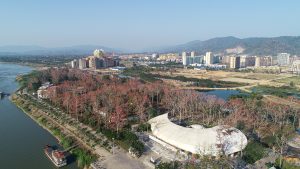The government of Laos has ordered online scammers to vacate a special economic zone in the northwest of the country, Radio Free Asia (RFA) reported earlier this week.
The Golden Triangle Special Economic Zone (GTSEZ), located in Bokeo province at the triborder area with Myanmar and Thailand, has become notorious for a range of illicit and criminal activities, including online fraud operations that rely overwhelmingly on trafficked labor.
According to the RFA report, which quoted senior officials, the issue was discussed at an August 9 meeting between the governor of Bokeo province, high-ranking officials from the Lao Ministry of Public Security, and Zhao Wei, the chairman of the GTSEZ. Lao authorities ordered all scam centers to be “completely shut down by August 25.”
Cyberscam operations have grown to a monstrous scale in mainland Southeast Asia over the past three years. Established in casinos and high-rise apartment blocks during the disruptions of the COVID-19 pandemic, they have been sustained by armies of indentured workers: innocent jobseekers who were attracted by promises of clean and legitimate employment, only to be kept imprisoned and forced to operate various types of digital scams, often on pain of beatings, mistreatment, and torture.
While most of these operations have been based in Cambodia and Myanmar, there is also substantial evidence that they have been established within the GTSEZ, which sits along the Mekong River close to the point where the borders of Laos, Myanmar, and Thailand converge.
This is no surprise, given the zone’s history of involvement in other criminal and illicit activities. GTSEZ is controlled by the Chinese-born businessman Zhao Wei, a veteran of Myanmar’s shady borderland casino scene who has been sanctioned by the U.S. government for his involvement in “drug trafficking, human trafficking, money laundering, bribery, and wildlife trafficking.” In late 2022, the South China Morning Post reported that the GTSEZ contained “a number of prison-like call centers for online scams.”
Despite a number of past raids, RFA paraphrased an anonymous Lao official as saying that “as many as 400 call centers were operating in the Golden Triangle SEZ, up from 305 a year earlier.” The centers were given the opportunity to “remove all of their belongings by the deadline,” the official told RFA. “After that, we’ll set up a special force to enforce the order.” Given that many of these operations have targeted Chinese nationals, the Chinese government has reportedly been working with Laos to deepen its crackdown.
The two years since have brought a stream of reports about foreign nationals being rescued from the GTSEZ after being trafficked there on false promises of legitimate work. There have also been reports of raids. Most recently, in July, 280 Chinese nationals, who were “alleged to have operated a fraudulent call center” in the GTSEZ, were arrested and deported to China via the Boten-Mohan border crossing in July. The November prior, 462 Chinese citizens were arrested during a raid in the GTSEZ and subsequently deported to China.
RFA reported that Lao and Chinese authorities had now carried out nine raids as of this week, arresting and deporting 1,389 people involved in scam operations, including 1,211 Chinese nationals.
It is hard to gauge how serious the Lao government’s warnings are. By previous accounts, the GTSEZ maintains its own security force and attempts to crack down on the criminality that is flowering in the zone have been partial and reactive. There is also a certain impunity – an assumption of good faith – built into Vientiane’s arrangement with Zhao Wei, who holds a 99-year lease to the 3,000-hectare area of the zone. The government awarded Zhao its Medal of Bravery in October 2022, right as the detailed reports of forced scamming operations within his zone were coming to light, and Lao state media continues to extoll the economic progress within the zone.
Two observers wrote in November 2022 that Lao labor officials “have seemed powerless to address human rights abuses, unable to meaningfully change the system as a whole, and only manage to occasionally rescue a few trafficked persons.” It added, “Laotian police also seem paralyzed, debating whether or not to get involved at all.”
Things may now have changed, given the scale of the criminality and the way in which it has affected the interests of China, the Lao government’s primary patron. But given that the structural conditions that have allowed such criminality to flourish remain largely in place, criminal activities of one kind or another are likely to persist.

































